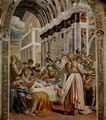Campi, Antonio
| Beruf: | Maler, Bildhauer, Illustrator |
| Geburtsort: | Cremona |
| Sterbedatum: | um 1591 |
| Wirkungszeitraum: | 2. Hälfte 16. Jh. |
| Wirkungsort: | Mailand, Piacenza, Mantua, Cremona |
Gemälde (1)
Grafiken (33)
Übersicht der vorhandenen Gemälde
- Abendmahl im Hause des Pharisäers, 1577, Cremona, San Sigismondo
Übersicht der vorhandenen Grafiken
- Illustration für Campis »Cremona fedelissima« [1], 1582–1584, Washington (D.C.), Library of Congress
- Illustration für Campis »Cremona fedelissima« [2], 1582–1584, Washington (D.C.), Library of Congress
- Illustration für Campis »Cremona fedelissima« [3], 1582–1584, Washington (D.C.), Library of Congress
- Illustration für Campis »Cremona fedelissima« [4], 1582–1584, Washington (D.C.), Library of Congress
- Illustration für Campis »Cremona fedelissima« [5], 1582–1584, Washington (D.C.), Library of Congress
- Illustration für Campis »Cremona fedelissima« [6], 1582–1584, Washington (D.C.), Library of Congress
- Illustration für Campis »Cremona fedelissima« [7], 1582–1584, Washington (D.C.), Library of Congress
- Illustration für Campis »Cremona fedelissima« [8], 1582–1584, Washington (D.C.), Library of Congress
- Illustration für Campis »Cremona fedelissima« [9], 1582–1584, Washington (D.C.), Library of Congress
- Illustration für Campis »Cremona fedelissima« [10], 1582–1584, Washington (D.C.), Library of Congress
- Illustration für Campis »Cremona fedelissima« [11], 1582–1584, Washington (D.C.), Library of Congress
- Illustration für Campis »Cremona fedelissima« [12], 1582–1584, Washington (D.C.), Library of Congress
- Illustration für Campis »Cremona fedelissima« [13], 1582–1584, Washington (D.C.), Library of Congress
- Illustration für Campis »Cremona fedelissima« [14], 1582, Washington (D.C.), Library of Congress
- Illustration für Campis »Cremona fedelissima« [15], 1582–1584, Washington (D.C.), Library of Congress
- Illustration für Campis »Cremona fedelissima« [16], 1582–1584, Washington (D.C.), Library of Congress
- Illustration für Campis »Cremona fedelissima« [17], 1582–1584, Washington (D.C.), Library of Congress
- Illustration für Campis »Cremona fedelissima« [18], 1582–1584, Washington (D.C.), Library of Congress
- Illustration für Campis »Cremona fedelissima« [19], 1582–1584, Washington (D.C.), Library of Congress
- Illustration für Campis »Cremona fedelissima« [20], 1582–1584, Washington (D.C.), Library of Congress
- Illustration für Campis »Cremona fedelissima« [21], 1582–1584, Washington (D.C.), Library of Congress
- Illustration für Campis »Cremona fedelissima« [22], 1582–1584, Washington (D.C.), Library of Congress
- Illustration für Campis »Cremona fedelissima« [23], 1582–1584, Washington (D.C.), Library of Congress
- Illustration für Campis »Cremona fedelissima« [24], 1582–1584, Washington (D.C.), Library of Congress
- Illustration für Campis »Cremona fedelissima« [25], 1582–1584, Washington (D.C.), Library of Congress
- Illustration für Campis »Cremona fedelissima« [26], 1582–1584, Washington (D.C.), Library of Congress
- Illustration für Campis »Cremona fedelissima« [27], 1582–1584, Washington (D.C.), Library of Congress
- Illustration für Campis »Cremona fedelissima« [28], 1582–1584, Washington (D.C.), Library of Congress
- Illustration für Campis »Cremona fedelissima« [29], 1582–1584, Washington (D.C.), Library of Congress
- Illustration für Campis »Cremona fedelissima« [30], 1582–1584, Washington (D.C.), Library of Congress
- Illustration für Campis »Cremona fedelissima« [31], 1582–1584, Washington (D.C.), Library of Congress
- Illustration für Campis »Cremona fedelissima« [32], 1582–1584, Washington (D.C.), Library of Congress
- Illustration für Campis »Cremona fedelissima« [33], 1582–1584, Washington (D.C.), Library of Congress
Buchempfehlung
Lewald, Fanny
Jenny
1843 gelingt Fanny Lewald mit einem der ersten Frauenromane in deutscher Sprache der literarische Durchbruch. Die autobiografisch inspirierte Titelfigur Jenny Meier entscheidet sich im Spannungsfeld zwischen Liebe und religiöser Orthodoxie zunächst gegen die Liebe, um später tragisch eines besseren belehrt zu werden.
220 Seiten, 11.80 Euro
Im Buch blättern
Ansehen bei Amazon
Buchempfehlung
Geschichten aus dem Sturm und Drang. Sechs Erzählungen
Zwischen 1765 und 1785 geht ein Ruck durch die deutsche Literatur. Sehr junge Autoren lehnen sich auf gegen den belehrenden Charakter der - die damalige Geisteskultur beherrschenden - Aufklärung. Mit Fantasie und Gemütskraft stürmen und drängen sie gegen die Moralvorstellungen des Feudalsystems, setzen Gefühl vor Verstand und fordern die Selbstständigkeit des Originalgenies. Michael Holzinger hat sechs eindrucksvolle Erzählungen von wütenden, jungen Männern des 18. Jahrhunderts ausgewählt.
- Jakob Michael Reinhold Lenz Zerbin oder Die neuere Philosophie
- Johann Karl Wezel Silvans Bibliothek oder die gelehrten Abenteuer
- Karl Philipp Moritz Andreas Hartknopf. Eine Allegorie
- Friedrich Schiller Der Geisterseher
- Johann Wolfgang Goethe Die Leiden des jungen Werther
- Friedrich Maximilian Klinger Fausts Leben, Taten und Höllenfahrt
468 Seiten, 19.80 Euro
Ansehen bei Amazon
- ZenoServer 4.030.014
- Nutzungsbedingungen
- Datenschutzerklärung
- Impressum



































